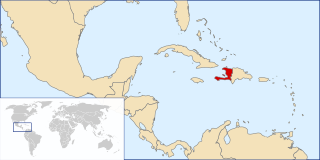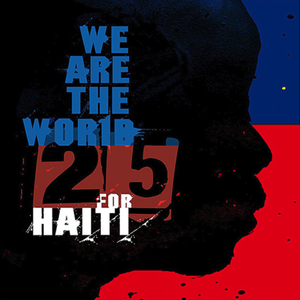Telecommunications in Haiti Internet, radio, television, fixed and mobile telephones.

Jean-Claude Duvalier, nicknamed "Baby Doc", was a Haitian politician who was the President of Haiti from 1971 until he was overthrown by a popular uprising in 1986. He succeeded his father François "Papa Doc" Duvalier as the ruler of Haiti after his death in 1971. After assuming power, he introduced cosmetic changes to his father's regime and delegated much authority to his advisors. Thousands of Haitians were killed or tortured, and hundreds of thousands fled the country during his presidency. He maintained a notoriously lavish lifestyle while poverty among his people remained the most widespread of any country in the Western Hemisphere.
The music of Haiti combines a wide range of influences drawn from the many people who have settled on this Caribbean island. It reflects French, African rhythms, Spanish elements and others who have inhabited the island of Hispaniola and minor native Taino influences. Styles of music unique to the nation of Haiti include music derived from rara parading music, twoubadou ballads, mini-jazz rock bands, rasin movement, hip hop Creòle, the wildly popular compas, and méringue as its basic rhythm. Haiti hadn't had a recorded music until 1937 when Jazz Guignard was recorded non-commercially. One of the most popular Haitian artists is Wyclef Jean. His music is somewhat hip-hop mixed with world music. Haitian music is influenced mostly by European colonial ties and African migration. In the case of European colonization, musical influence has derived primarily from the French.

Cap-Haïtien often referred to as Le Cap or Au Cap, is a commune of about 190,000 people on the north coast of Haiti and capital of the department of Nord. Previously named Cap‑Français and Cap‑Henri, it was historically nicknamed the Paris of the Antilles, because of its wealth and sophistication, expressed through its architecture and artistic life. It was an important city during the colonial period, serving as the capital of the French Colony of Saint-Domingue from the city's formal foundation in 1711 until 1770 when the capital was moved to Port-au-Prince. After the Haitian Revolution, it became the capital of the Kingdom of Northern Haiti under King Henri Christophe until 1820.

Gonaïves is a commune in northern Haiti, and the capital of the Artibonite department of Haiti. It has a population of about 300,000 people. The city of Gonaïves was founded in 1422 by Indians who named it Gonaibo. It is also known as Haiti's "independence city". The Bay of Gonaïves is named after the town.

Haitian Creole is a French-based creole language spoken by 10–12 million people worldwide, and the only language of most Haitians. It is called kreyòl ayisyen or just kreyòl by its speakers, and créole haïtien in Standard French.

Hinche is a commune in the Centre department Haiti. It has a population of about 50,000. It is the capital of the Centre department. Hinche is the hometown of Charlemagne Péralte, the Haitian nationalist leader who resisted the United States occupation of Haiti that lasted between 1915–1934.

Port-de-Paix is a commune and the capital of the Nord-Ouest department of Haiti on the Atlantic coast. It has a population of 462,000. Port-de-Paix used to be a large exporter of bananas and coffee.

The Agronomist is a 2003 American documentary directed by Jonathan Demme about Jean Dominique. The documentary follows the life of Dominique, who ran Haiti's first independent radio station, Radio Haiti-Inter, during multiple repressive regimes.

Saint-Marc is a commune in western Haiti in Artibonite. Its geographic coordinates are 19°7′N72°42′W. At the 2003 Census the commune had 160,181 inhabitants. It is one of the biggest cities, second to Gonaïve, between Port-au-Prince and Cap-Haïtien.

Thomonde is a commune in the Hinche Arrondissement, in the Centre department of Haiti. It is located in the Centre or "Plateau Central", arrondissement Hinche. The geo-coordinates are 19.02N and 71.97W. The population was about 2,381 in 1982 and about 3,784 in 2007 - as reported by the government of Haiti.
As in many developing countries, radio reaches the widest audience in Haiti. Estimates vary, but more than 300 radio stations are believed to broadcast throughout the country. It's easy now to listen to all Haiti radio online on Haiti Media Live http://haitimedia.live Talk show programs serve as one of the few ways in which ordinary Haitians can speak out about politics and the government. A law passed in 1997 declares the airwaves to be the property of the government, but at least 133 unlicensed radio stations operate freely. In addition, there are 50 community-based stations throughout the country.

Camp-Perrin is a commune in the Les Cayes Arrondissement, in the Sud department of Haiti. It has 40,962 inhabitants.

The 2010 Haiti earthquake was a catastrophic magnitude 7.0 Mw earthquake, with an epicenter near the town of Léogâne (Ouest) and approximately 25 kilometres (16 mi) west of Port-au-Prince, Haiti's capital. The earthquake occurred at 16:53 local time on Tuesday, 12 January 2010.

"We Are the World 25 for Haiti" is a charity single recorded by the supergroup Artists for Haiti in 2010. It is a remake of the 1985 hit song "We Are the World", which was written by American musicians Michael Jackson and Lionel Richie, and was recorded by USA for Africa to benefit famine relief in Africa. Initially, in late 2009, it had been suggested to Richie and Quincy Jones—producer of the original "We Are the World"—that a re-cut version of the song be re-released under the title "Live 25". Following the magnitude 7.0 Mw earthquake in Haiti, which devastated the area and killed thousands of people, it was agreed that the song would be re-recorded by new artists, in the hope that it would reach a new generation and help benefit the people of Haiti.
Sony Esteus is a Haitian radio journalist. For seventeen years, he has served as executive director of Sosyete Animasyon Kominikayon Sosyal, an organization supporting Haitian community-based radio. At its height, SAKS supported around 30 community radio stations around the country, though many of these faced difficulties and suspended broadcasts following the 2010 earthquake. Esteus also serves as the Caribbean representative of the World Association of Community Radio Broadcasters.
Haitian Cubans are Cuban citizens of full or partial Haitian ancestry.
Haitian French is the variety of French spoken in Haiti. Haitian French is close to standard French. It should be distinguished from Haitian Creole.
Television in Haiti includes several stations including Christian live streaming channels.










